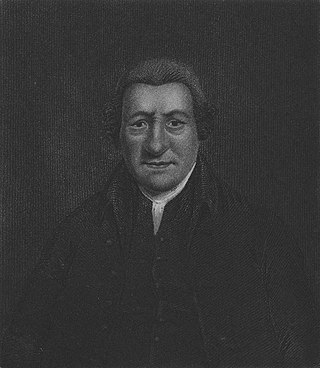Related Research Articles

John Taylor (1694–1761) was an English dissenting preacher, Hebrew scholar, and theologian.

Thomas Emlyn (1663–1741) was an English nonconformist divine.
Edward Harwood (1729–1794) was a prolific English classical scholar and biblical critic.

Joshua Toulmin of Taunton, England was a noted theologian and a serial Dissenting minister of Presbyterian (1761–1764), Baptist (1765–1803), and then Unitarian (1804–1815) congregations. Toulmin's sympathy for both the American (1775–1783) and French (1787–1799) revolutions led the Englishman to be associated with the United States and gained the prolific historian the reputation of a religious radical.
James Foster was an English Baptist minister.
Hugh Farmer was an English Dissenter and theologian.

Francis Blackburne was an English Anglican clergyman, archdeacon of Cleveland and an activist against the requirement of subscription to the Thirty Nine Articles.
Caleb Ashworth, D.D. was an English dissenting tutor.
Benjamin Avery, LL.D. was an English physician.

Thomas Bradbury (1677–1759) was an English Dissenting minister.
Samuel Bourn the Younger was an English dissenting minister. He was an English presbyterian preaching on protestant values learned from the New Testament. Through his published sermons, he entered the theological debate that flourished around the Arian controversy, and the doctrinal question as to Man's essential nature. He contested the Deism of the Norwich rationalists in the early enlightenment, and challenged the Trinitarian conventional wisdoms about the seat of humanity and its origins.
John Brekell (1697–1769) was an English presbyterian minister and theological writer.
Henry Grove was an English nonconformist minister, theologian, and dissenting tutor.
James Duchal, D.D. (1697–1761) was an Irish Presbyterian divine.
John Wiche (1718–1794) was an English Baptist minister.
John Cameron (1724–1799), born near Edinburgh, was a Scottish Presbyterian minister, active in Ulster.

James Fisher (1697–1775) was one of the founders of the Scottish Secession church. He was born at Barr, on 23 January 1697, the second son of Thomas Fisher, minister of Rhynd. He was educated at University of Glasgow. He was licensed by the Presbytery of Perth on 31 October 1722 and subsequently called and ordained on 23 December 1725. He dissented and joined with his father-in-law Ebenezer Erskine in his appeal and complaint to the Assembly of 1733. He was one of the four original members of the Associate Presbytery founded at Gairney Bridge on 6 December 1733. He was deposed by the General Assembly on 15 May 1740, but continued to preach in the parish church till 13 August 1741, when he was forcibly ejected on a sheriff's warrant. He then preached in a tent on Kinclaven brae during the time he remained in the district. On 8 October 1741 he became minister of Shuttle Street Associate Congregation, Glasgow. He was deposed by the Associate (Antiburgher) Synod on 4 August 1748 over the question of the Burgess Oath. He was appointed Professor of Divinity by the Associate (Burgher) Synod in 1749. He died on 28 September 1775.
Caleb Fleming, D.D. was an English dissenting minister and polemicist.
Samuel Palmer (1741–1813) was an English nonconformist minister, known as a biographer.
References
- Stephen, Leslie, ed. (1887). . Dictionary of National Biography . Vol. 9. London: Smith, Elder & Co.
Attribution
![]() This article incorporates text from a publication now in the public domain : Stephen, Leslie, ed. (1887). "Cardale, Paul". Dictionary of National Biography . Vol. 9. London: Smith, Elder & Co.
This article incorporates text from a publication now in the public domain : Stephen, Leslie, ed. (1887). "Cardale, Paul". Dictionary of National Biography . Vol. 9. London: Smith, Elder & Co.